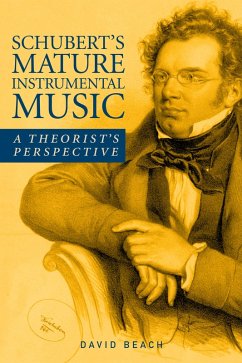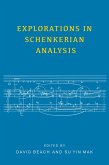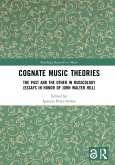Probing analyses, from the renowned music theorist, of Schubert's great, yet still little-studied piano-solo, chamber, and symphonic masterpieces.
In his instrumental works, Franz Schubert, like Beethoven, expanded on the classical traditions, especially in the areas of form and harmony. Yet many of these works have only recently begun to be appreciated for their true worthby performers, listeners, and scholars.
Schubert's Mature Instrumental Music, by renowned music theorist David Beach, is an analytical study of selected symphonic, chamber, and solo-piano works written during the last ten years of the composer's short life, beginning with the Trout Quintet (D. 667) and ending with the String Quintet (D. 956).
Each of the chapters in part 1 focuses on a crucial topic: harmony, phrase rhythm, motive,and sonata form. These chapters will be accessible to all musicians and other readers who have some basic training in harmony and form. Part 2 presents detailed analyses of nine fascinating representative movements.
Beach's insights will enrich the listener's experience of what are now recognized as some of the great masterpieces of the early nineteenth century.
David Beach is Professor Emeritus and former Dean of the Faculty of Music atthe University of Toronto. He is the author of Aspects of Unity in J. S. Bach's Partitas and Suites: An Analytical Study, and coeditor of Bach to Brahms: Essays on Musical Design and Structure and Explorations inSchenkerian Analysis, all published by the University of Rochester Press.
In his instrumental works, Franz Schubert, like Beethoven, expanded on the classical traditions, especially in the areas of form and harmony. Yet many of these works have only recently begun to be appreciated for their true worthby performers, listeners, and scholars.
Schubert's Mature Instrumental Music, by renowned music theorist David Beach, is an analytical study of selected symphonic, chamber, and solo-piano works written during the last ten years of the composer's short life, beginning with the Trout Quintet (D. 667) and ending with the String Quintet (D. 956).
Each of the chapters in part 1 focuses on a crucial topic: harmony, phrase rhythm, motive,and sonata form. These chapters will be accessible to all musicians and other readers who have some basic training in harmony and form. Part 2 presents detailed analyses of nine fascinating representative movements.
Beach's insights will enrich the listener's experience of what are now recognized as some of the great masterpieces of the early nineteenth century.
David Beach is Professor Emeritus and former Dean of the Faculty of Music atthe University of Toronto. He is the author of Aspects of Unity in J. S. Bach's Partitas and Suites: An Analytical Study, and coeditor of Bach to Brahms: Essays on Musical Design and Structure and Explorations inSchenkerian Analysis, all published by the University of Rochester Press.
Dieser Download kann aus rechtlichen Gründen nur mit Rechnungsadresse in A, D ausgeliefert werden.









